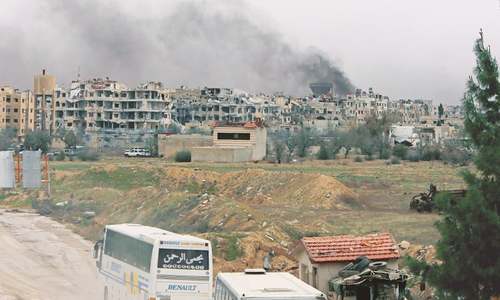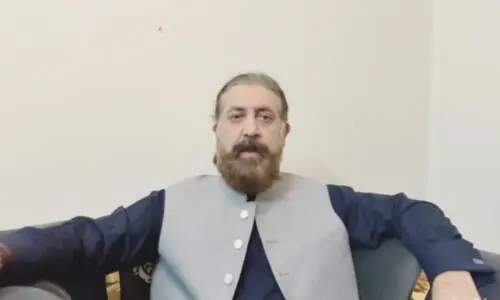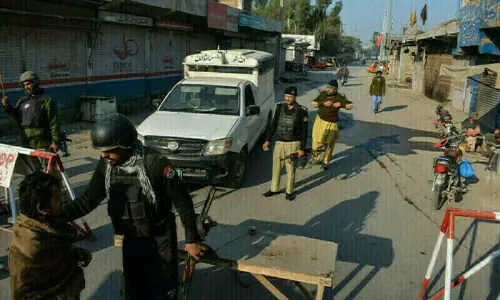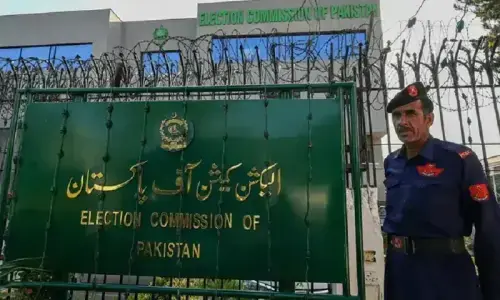
THEY were frightened but the civilians from Douma in Eastern Ghouta were alive. Sat quietly on the government bus that had brought them to the Arbeen crossing were the children with their mothers, the old men, watchful, the younger men looking out of the windows. When we climbed aboard alone with them, notebook in hand and camera moving across the passengers, they sat like extras in a movie, faces from the siege. Were they silent because they were fearful of the future? Or because they were still trying to frame their own suffering of the past?
We were all aware of the usual rumours; that those armed jihadis who had refused the Russian conditions for leaving the besieged villages and fields of Ghouta would shell the refugees to discourage them from crossing. Rubbish. Or that’s what we thought until a mortar swished over the buses and crashed in the powdered rubble 30 metres away. The refugees turned their heads like birds towards the cloud of smoke rising into the sky, and the Syrian soldiers outside ran towards the buses. A general climbed aboard. “Get these buses moving!” he shouted.
On the bus — and in the hours that followed — we tried to put together the story of Eastern Ghouta and soon realised that it would take a year, perhaps a decade, to understand the killing and the cynicism and the innocent suffering behind this epic battle. There were things one noticed which did not quite match the narrative; these people talked of living in tunnels. But the passengers and the thousands of refugees we met later were clearly not starving. Their faces were full, their clothes were clean. But most had lost relatives or friends.
We will not mention here the large number of Islamic fighters we were to see emerging from the rubble under the Russian peace agreement — a vast army compared to the few fighters we had expected, coming out in their hundreds, bearded men whom we had not seen, ever, in those mortifying videos of civilian suffering that came to us from the siege over many weeks. How come we had not seen them before? Some still carried their weapons. But that is, as they say, for tomorrow. Civilians must come first.
A man with grey stubble who might have been 65 but who was only 48, said his 18-year-old son had been kidnapped by “terrorists” and was not allowed to leave with him. Nisreen, a woman in black, spoke of the bombardment of Douma. She did not mention aircraft — and said that both her husband and 11-year-old son had died in the original bombing of Eastern Ghouta more than two years ago.
The buses moved at speed away from this front line and we followed them across the muddy laneways south of Adra city to where a former children’s holiday camp now housed 15,000 of the civilians who had already managed to flee Ghouta. It was a slightly shabby institution but there were flowers and UN tents and piles of bread. Despite the propaganda, this was no show camp for visitors — it took a long time to negotiate our way inside. There were piles of bread and UN tents and men selling coffee; most seemed eager to talk to us — up to a point.
A young woman in a pale scarf said that, yes, she had lost three members of her family in Douma. Her sick father had died from lack of medicine, and her nephew and the daughter of her cousin had been killed from what she called “crossfire”. I was to hear more of this “crossfire” as the hours went by. The man had mentioned this on the bus and another figure making coffee by a gas stove talked of more “crossfire”, between the Faylaq al-Rahman and Jaish al-Islam fighters. If you believed this, then there must have been an awful lot of internecine gun battles between the jihadis as the Syrians and Russians rained fire upon them.
When I asked another woman if she knew of civilians killed in the Syrian and Russian bombing of this month, a Syrian NGO lady who spoke enough English to be unpleasant, demanded “For who you work? ‘Independent’? NOT independent!”
But slowly the stories were told. There was a man in a wheelchair, Alaa Younis, with a bullet wound in his neck who had been paralysed from the waist down. His wounds were real, his waist bound with fresh medical tape, his face sometimes contorted with pain. Then came another woman who spoke this time of the bombs, “falling in the streets, and all the houses had come down in the streets”.
And then towards us, smiling but with what must have been the saddest face in Syria, came 53-year old Sana el-Boukeri. She wore spectacles and was dressed in black and wanted to talk. Yes, she had been in Douma during the bombing. And four months ago, her husband Jamal el-Din and her 13-year-old son Mahmoud were in the street when bombs came down and they were killed. Sana did not cry, she simply looked at us to see if we understood her and she obviously wanted to talk. Many times she shook her head.
It emerged that she was a historical vision of Syria’s terrible war. For she said that her other son was an 18-year-old soldier, and that he was fighting in the Syrian army unit commanded by Gen Soheil Hassan, the “Tiger”, now the military’s favourite soldier — and Vladimir Putin’s too, so it is said — who has reputedly never lost a battle and who was personally on the battlefront in Eastern Ghouta. But this son, she said, had been wounded a week ago and she’s had no telephone contact with him since. So while one son was killed in the Syrian bombardment, the other was fighting for the government, perhaps only a mile away. Sana stood in front of us, swaying slightly, her spectacles reflecting the sun, occasionally looking at the other refugees to see if they understood her story.
There were other groups sitting on the grass or in the shade of the brown concrete camp offices. “We lived in tunnels — for weeks,” one man said. “They [the fighters] would not let us leave the tunnels. They lived in the tunnels with us. They stole the aid that came for us from outside.” But why were they in the tunnels in the first place? The answer was obvious: to avoid the Syrian and Russian bombs. But they did not mention this. They spoke of the price of bread — £8 for 800 grams — and how the cost of a pack of 10 cigarettes had soared from $2 to $80. But surely this was not the cost of this devastating siege.
When new refugees arrived at the camp, I saw no mukhabarrat intelligence men — the white-socked, leather jacketed regime operatives paid to sniff out subversives — checking the incoming buses. Nor wandering around in the camp, though there may have been willing stool-pigeons. But many of the el-Ghouta people had relatives in the centre of Damascus, and they left freely when relatives called for them. There was no violence, no shouting. This does not give anyone a clean slate. Indeed, Ibrahim Hassoun, the schoolteacher who runs the camp insisted that men who admitted they had fought for the jihadis were free to go to Damascus city if they promised to leave their weapons forever. “They are now civilians again — the president said they must be free to relive their natural lives again.”
But opposition groups have claimed that refugee men fear they will be enlisted in the Syrian army if they left their homes in el-Ghouta. And Ibrahim Hassoun agreed that there was an office where all men aged between 20 and 50 years must go within 15 days of their arrival to be questioned by the “general security”.
“Yes, you can go there – you can see the men waiting. You can see the rooms. If a man is of the age for military service, yes, he must join the army like all others do in Syria. If they are fighters, they will be trained for six months and then there will be rehabilitation — for their minds.”
So was this reprogramming? Or what we like to call “de-radicalisation”? We set off to the security building and there, outside, were a group of men sitting on the ground, close together, waiting for their turn at the desk with the computer inside and the man behind it. Some smiled at our camera, several hid their faces; one held up an identity card. We climbed the steps and peered into the hall. There were a line of desks, young men behind computer consoles and others sitting in front. They did not expect us. There were no cells, no interrogation rooms. But the men outside were nervous, frightened may not be too strong a word. They knew what had happened in Eastern Ghouta. But how much would they tell?
Mr Hassoun was full of reassurances. Medical facilities were good at the camp — this appeared to be true — 12 pregnant refugee woman had been delivered of their children, another had given birth in the camp which holds 10,000 women and children and 5,000 men.
He listed the villages they came from in the dozens of square miles of Ghouta: Jobar, Sawa, Beit Sawa, Hosh Nusri, Taube, Zibdin… “The badly injured are moved to our hospitals, others can be treated here. The fighters who have come here are now civilians. An officer takes their names, but they will not be arrested.”
—By arrangement with The Independent
Published in Dawn, March 29th, 2018


































